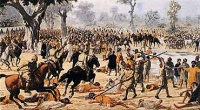Template:AOW138: Difference between revisions
Hari singh (talk | contribs) (New page: {{aowh|Guru ka Bagh}} thumb|200px|{{cs|'''Sikhs being beaten with long batons at Guru ka Bagh'''}} On the '''August 8 every year''', the Sikhs remember the...) |
Hari singh (talk | contribs) No edit summary |
||
| Line 3: | Line 3: | ||
[[Image:Gurubagh.jpg|thumb|200px|{{cs|'''Sikhs being beaten with long batons at Guru ka Bagh'''}}]] | [[Image:Gurubagh.jpg|thumb|200px|{{cs|'''Sikhs being beaten with long batons at Guru ka Bagh'''}}]] | ||
On | On '''August 8 every year''', the [[Sikh]]s remember the sacrifice made by thousands of their brethrens in respect of Guru ka Bagh Gurdwaras. This article outlines the struggle by the [[Sikh]]s to see justice in respect religious freedom, their right to determine their religion and the management of their [[Gurdwara]]s. Below is an account of a major campaign in the Sikh agitation that took place in early 1920's. This resistance was for the reformation of their [[Gurdwara]]s (holy places). Many Gurdwara had been freed without much problem but they faced a serious hurdle here. Guru ka Bagh in Ghukkevali village is located about 20 km from [[Amritsar]]. It has two historic [[gurdwara]]s close to each other, commemorating the visits respectively of [[Guru Arjan]] in 1585 and [[Guru Tegh Bahadur]] in 1664. | ||
The latter is laid out on the site of a bagh (garden) which gave the place its name. Like most | The latter is laid out on the site of a bagh (garden) which gave the place its name. Like most historical gurdwaras, the management of these two had passed into the hands of [[mahant]]s or abbots belonging to the monastic order of Udasi Sikhs many years ago. The granting of jagirs (gifts of land) to such sacred places in Sikh times and the offerings of the [[sangat]] (devotees) had made the custodians [[mahant]]s wealthy and prone to luxury. At Guru-ka-Bagh, the Sikhs' capacity for suffering and resistance was put to the test. After freeing many Gurdwaras through peaceful resistance, they were faced with a more challenging task here. {{aowf|Guru ka Bagh}} | ||
Revision as of 18:06, 10 August 2007
On August 8 every year, the Sikhs remember the sacrifice made by thousands of their brethrens in respect of Guru ka Bagh Gurdwaras. This article outlines the struggle by the Sikhs to see justice in respect religious freedom, their right to determine their religion and the management of their Gurdwaras. Below is an account of a major campaign in the Sikh agitation that took place in early 1920's. This resistance was for the reformation of their Gurdwaras (holy places). Many Gurdwara had been freed without much problem but they faced a serious hurdle here. Guru ka Bagh in Ghukkevali village is located about 20 km from Amritsar. It has two historic gurdwaras close to each other, commemorating the visits respectively of Guru Arjan in 1585 and Guru Tegh Bahadur in 1664.
The latter is laid out on the site of a bagh (garden) which gave the place its name. Like most historical gurdwaras, the management of these two had passed into the hands of mahants or abbots belonging to the monastic order of Udasi Sikhs many years ago. The granting of jagirs (gifts of land) to such sacred places in Sikh times and the offerings of the sangat (devotees) had made the custodians mahants wealthy and prone to luxury. At Guru-ka-Bagh, the Sikhs' capacity for suffering and resistance was put to the test. After freeing many Gurdwaras through peaceful resistance, they were faced with a more challenging task here. .....More

